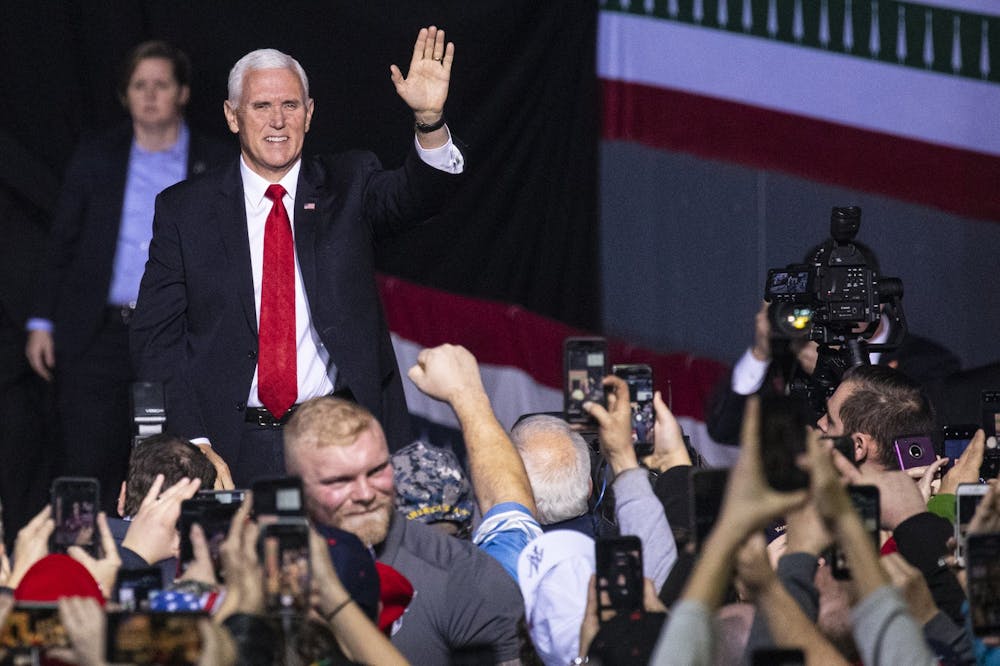Most IU students have grown up with the religious right, also marketed by its twentieth-century organizers as the “Moral Majority,” as a powerful voting bloc in the United States. In 2020, those of us who identify both as Christian and progressive need to form a bloc to rival them.
The bloc of right-wing Christian voters is fairly new, only rising to prominence in the 1980s, when televangelist Jerry Falwell managed to unite Protestants and Catholics for the first time on issues we now call “culture war” issues, like gay marriage and abortion.
When we talk about the religious right, though, we often fail to ask what should be an obvious set of questions. Where are the progressive Christians? Where are Christians who break bread with the marginalized and scapegoated? Where are those whose pro-life identity includes being in favor of universal healthcare and just wages? Where are those who, like Pope Francis, hear God’s call in the Bible to be stewards of the Earth by mobilizing against climate change?
Many of us know from our own lives here in Bloomington that progressive Christians exist. Given IU’s large religious population, in fact, someone probably came to mind while you read that litany of questions. Even though they aren’t as known for their faith as their conservative counterparts, there are progressive Christians holding and seeking public office, too.
For example, Democratic presidential candidate Pete Buttigieg has spoken about the need for a religious left often in his presidential campaign, speaking openly about the ways in which his faith informs his progressive values. As a gay man from Vice President Mike Pence’s Indiana, he addressed the former governor’s anti-gay record by statingin April 2019, “Your quarrel, sir, is with my creator.”
Buttigieg is not the only Christian Democratic presidential candidate whose faith informs his platform. Julian Castro, a Catholic, recently escorted an asylum seeker to an ICE facility in Iowa, praying with him outside of the facility before they entered together. Sen. Elizabeth Warren, D-Mass. has explained the ways in which “my faith animates all that I do.”
With these and other high-profile examples, why hasn’t the religious left organized? The simplest reason for the absence of an organized religious left might be that progressives believe religion should stay out of politics, while conservatives are more comfortable blurring the line between church and state. This is undoubtedly a factor, and the importance of the separation of church and state cannot be overstated.
However, when religion makes its way into politics, the implication that God belongs to any given political party should not go unchallenged. Politicians like President Donald Trump do not deserve a blind, uncontested vote on the basis of faith.
An organized Christian progressivism has a long history it could call upon. Five hundred years ago, Jesuit missionaries like Bartolome de las Casas were instrumental in the development of universal human rights. Quakers were among the first white people in the U.S. to denounce and actively fight against slavery.
Reverend Martin Luther King Jr.'s civil rights activism in the 1960s affects our lives every day, and his commitment to nonviolence still influences our protest tradition. Father Dan Berrigan burned draft cards with homemade napalm during the Vietnam War. And just last year, Catholics led a protest against ICE in New Jersey.
In “A Man Without a Country,” Kurt Vonnegut brings a crucial point to our attention: many vocal Christians “demand that the Ten Commandments be posted in public buildings… I haven’t heard one of them demand that [the Beatitudes] be posted anywhere. ‘Blessed are the merciful’ in a courtroom? ‘Blessed are the peacemakers’ in the Pentagon? Give me a break!”
If Christians around the country truly want to vote in accord with our faith, we have to think about more than one or two “culture war” issues when we go to the ballot box. We are called to rally against violations of civil liberties and acts of violence, from school shootings to war crimes. We are called to take care of the refugee and the prisoner with compassion and generosity. In short, we are called to at least as many progressive ends as conservative ones.
Kaity Radde (she/her) is a sophomore studying political science. She plans to pursue a career in public interest law.





